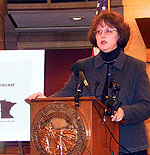Ventura rejects budget plan; override appears likely
By Michael Khoo
Minnesota Public Radio
February 26, 2002
Legislators are expected to try to override Gov. Jesse Ventura's veto of a budget-balancing plan that lawmakers crafted last week. Ventura criticized the package for relying too heavily on one-time budget reserves to repair what he considers an on-going problem. Lawmakers say they're disappointed in the governor's action, but will act quickly to overturn his veto. The maneuvering comes on the heels of another budget forecast showing even larger deficits than originally anticipated.
| |
|
|
|
||
In announcing his veto (Listen), Ventura criticized lawmakers for taking "a politically easy route to balancing the budget deficit." He says their reliance on one-time reserve funds to patch an ongoing problem was short-sighted and indicated a lack of resolve. The governor's own plan relies on significant spending cuts and targeted tax hikes, a plan he justified by invoking the terrorist attacks of last fall and the nation's campaign against terrorism.
"During World War II, our parents' generation sacrificed greatly. They survived rationing of food products and gasoline. Unfortunately, our legislators do not seem to understand that taxes and personal sacrifice are the price that we pay for freedom," Ventura said.
Ventura suggested an attempt to override his veto would be unpatriotic, a charge lawmakers rebuffed as "ridiculous and shameless." Republican House Majority Leader Tim Pawlenty, who hopes to take Ventura's place in next fall's elections, says the legislative plan is a bipartisan approach that demonstrates tax increases aren't necessary.
"Maybe a light bulb would go off in his head and say, when even the Democrats aren't calling for tax increases, maybe this can be done without it. Maybe he needs to fine-tune his hearing a little bit and be a little more in touch with the process," Pawlenty said.
| |
|
|
|
||
The governor had spent the past four days studying the budget bill, which wipes out nearly $2 billion in projected deficits. In the end, he decided to veto the package after concluding it spent state reserves with no clear plan for replacing them. And he says the bill didn't go far enough towards addressing anticipated future deficits.
DFL Senate Majority Leader Roger Moe, another gubernatorial candidate, says lawmakers are committed to replenishing the reserves and providing a long-term fix. But he says the governor's veto indicates the administration would rather not be part of the solution.
"He could have signed this bill and he could then have said, 'Alright, I'll meet you part way on all of this. I'll show you that I'm ready, willing, and able to work with you. I'll sign this bill but these are some things that I have to have in the next phase.' That would have sent a very strong message that he was willing to cooperate. Obviously this does not do that," Moe said.
Ventura has already been overridden more than any other governor in state history, and Moe and Republican leaders are predicting another quick override.
The only wrinkle lies in what House DFLers decide. House Democrats were the only caucus to oppose the legislative plan, mainly because of its cuts to K-12 and higher education.
| |
|
|
|
||
Minority Leader Tom Pugh says his members are under increasing pressure to overturn the governor's decision. A new state forecast shows the current budget deficit has increased from roughly $2 to $2.3 billion. Long-term deficits grew even more - from $2.5 billion in the next biennium to $3.2 billion.
Pugh says if the veto holds, it will send negotiators back to the bargaining table. He says education could fare even worse if a new deal must be crafted.
"I'd have difficulty convincing Sen. Moe and Speaker Sviggum to hold education harmless. So from a practical side, sustaining the veto may not advance the cause of education from this current bill," according to Pugh.
House and Senate leaders say if and when the override goes through, they'll take immediate action to fill in the gap between their budget-balancing plan and the new, larger deficit. Afterwards, they say they'll try to address Ventura's concerns about restoring state reserves and crafting a long-term solution.
Leaders acknowledge those choices will be more difficult to make and aren't guaranteeing a compromise by the end of the session.
More from MPRMore Information



